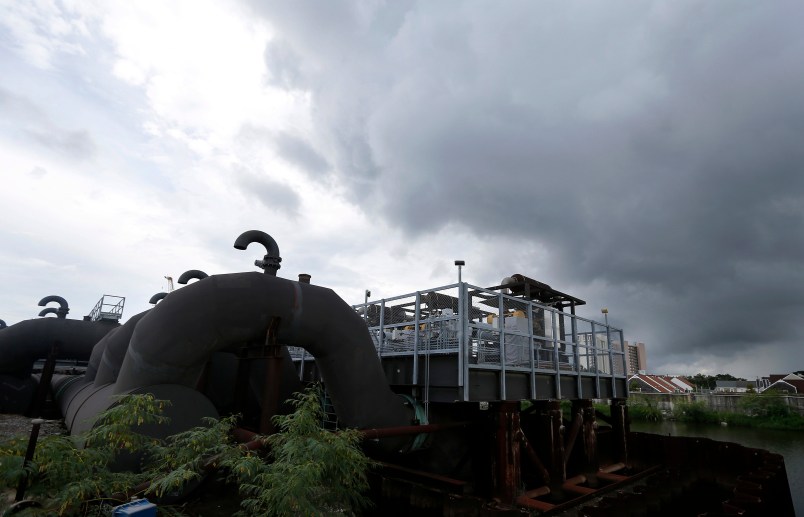NEW ORLEANS (AP) — When Tropical Storm Nate formed Thursday and forecasts put New Orleans in its projected path, one big question loomed for residents and business owners: Will the pumps work?
“That’s now a thought in everybody who lives in New Orleans,” said Devin Shearman, a manager at Katie’s restaurant and lounge, which flooded during an unexpected rainstorm Aug. 5. It was one of two flash floods this past summer that led to revelations about personnel and equipment problems at the New Orleans Sewerage and Water Board, the agency that runs the pumping system that drains the city.
Some pumps weren’t working. Some turbines that provide power to the pumps were down. There weren’t enough people on hand to man the system.
“Since early August, we have made substantial progress,” New Orleans Mayor Mitch Landrieu said of work to upgrade the city drainage system. But he warned at a Thursday news conference that extremely heavy rain and storm surge from Nate still could pose flood dangers.
Nate formed in the western Caribbean Sea and moved into Central America on Thursday. Forecasters said it would likely emerge in the Gulf of Mexico and strengthen, possibly reaching hurricane strength before a Sunday morning landfall somewhere along the Louisiana, Mississippi or Alabama coast. Officials in the resort town of Grand Isle on a vulnerable barrier island south of New Orleans called a voluntary evacuation Thursday. To the east, in coastal St. Bernard Parish, authorities ordered an evacuation of areas not protected by levees.
In the center of Nate’s possible destinations was New Orleans, where the summer floods shook public confidence in the Sewerage and Water Board.
It’s a state-created agency governed by a board that includes the mayor and appointees of the mayor and the City Council.
After the Aug. 5 revelations, the agency’s executive director, Cedric Grant, resigned. Landrieu announced the appointment of a new six-member emergency team to run the agency, make immediate upgrades and recommend long-term changes.
The team is headed by veteran emergency expert Paul Rainwater.
“It’s an antiquated system,” Rainwater said Thursday, as he discussed his work and the decisions ahead on what will be needed in terms of equipment and personnel.
As of Thursday, city officials said, 108 of 120 pumps and 26 power generators were in place to back up working turbines. Also, the city said efforts to clean thousands of street catch basins had been stepped up, with vacuum trucks dispatched to various areas to suck out thick mud and debris.
Long-term, a major question facing the city is whether to stick with nearly century-old pumps, which cost a lot of money and manpower to maintain but last longer than newer pumps that are reported to have shorter lifespans.
Many are also questioning where the S&WB leadership needs to rest. One option is reducing its autonomy — making it a department directly under the mayor with scrutiny from the council. It’s a suggestion New Orleans Inspector General Ed Quatrevaux has made to the mayor and City Council in letters for years.
Meanwhile, city officials must deal with the public’s shaken faith in the drainage system.
The Sewerage and Water Board’s emergency management team also included a new public relations director — a result of early, erroneous initial statements that the pumps were all working during the Aug. 5 floods.
“There was a lot of misinformation, or lies, frankly, about where we stood,” City Council President Jason Williams said in a recent interview. “Moving forward, we’ve got to make sure that the Sewerage & Water Board is transparent to the public and to all branches of government, because clearly that wasn’t happening, and that there’s veracity, just being really honest.”
Williams said in a recent interview that council members recently learned pumping capacity wasn’t tested ahead of the hurricane season that began June 1.
“It’s not a time to figure out things when you’re under water and when you’re in a kayak,” he said.
“I’m glad they’re addressing it, finally, but I don’t know if you can get my approval for addressing it now, after something’s happened,” said Shearman, who says patrons were stranded in the restaurant for hours in August when water in the streets was thigh-high. “Trust can be brought back. It’s not going to come overnight though. It’s going to take a lot of time.”



